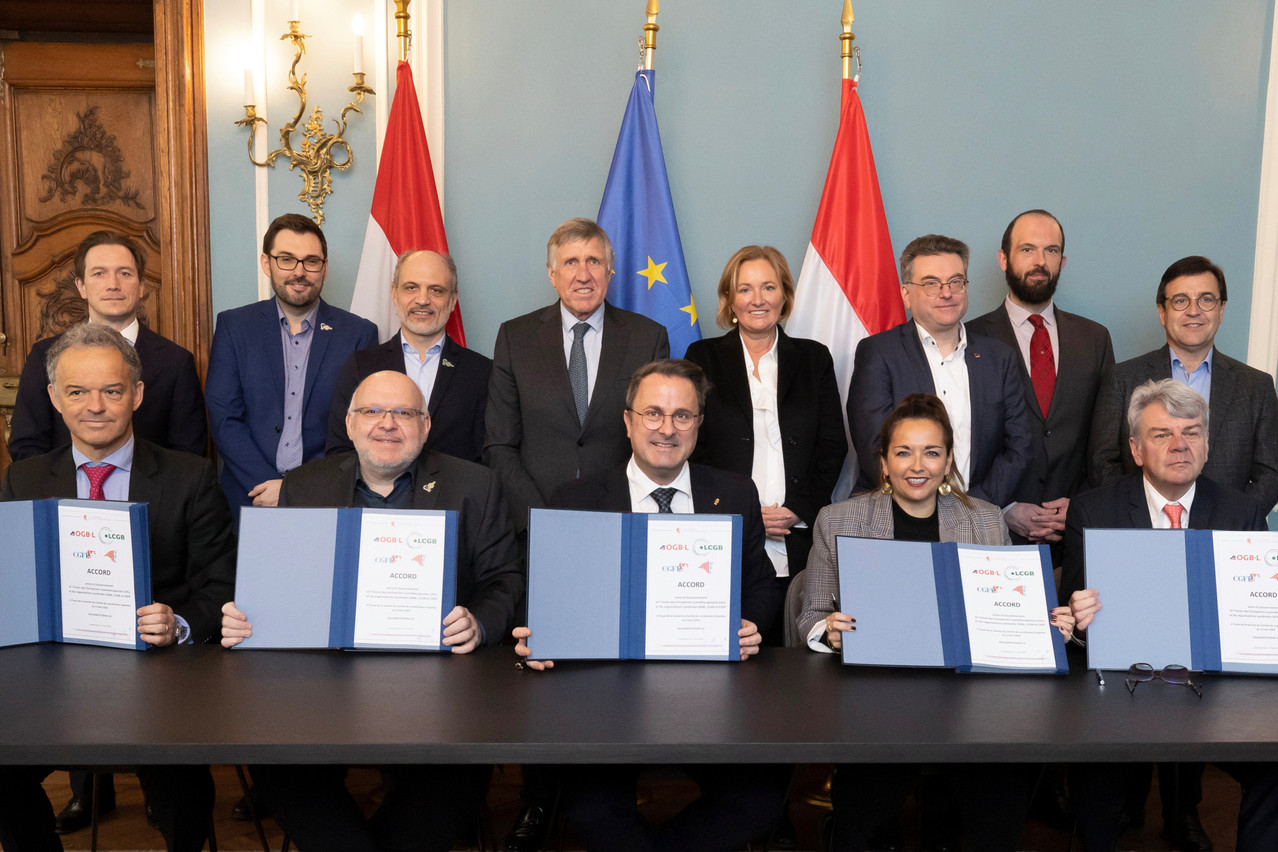Following negotiations, the government and social partners announced on Friday 3 March a series of measures included in the since the beginning of the energy crisis. Four days later, they have signed the full text.
Here is what it contains, in detail.
Index compensation for companies and maintenance of the system
After having shifted the index from July 2022 to April 2023 during a , replacing it in the meantime with an , the reinstated the indexation system, with the promise made to companies that the government would take charge of them in the event of a “third” index in the year, if we count the one in and the one postponed to April. According to Statec projections, the latter is likely to occur.
In the latest agreement, the government specifies how it intends to compensate companies. This will be done by “adjusting the average contribution rate of the Employers’ Mutual Insurance Association by up to €60m per month in favour of employers for whom the wage index is not already covered by a legal or regulatory mechanism.” The adjustment of the contribution rate will take place in the 2024 financial year, or will be spread out until 2025 if these class rates become negative.
While this indexation was initially only supposed to be compensated for 2023, it will finally be compensated up to and including January 2024.
At the same time, the automatic operation of the sliding wage scale is maintained.
Personal income tax scale adapted
The trade unions had demanded the adjustment of eight index brackets, but the compromise was finally reached on two and a half brackets, i.e., 6.25% (one bracket representing 2.5%). However, this will not take effect until 2024. In the meantime, for 2023, a tax credit will be introduced--retroactive to 1 January--to compensate for the equivalent of two index brackets.
Solidaritéitspak 2.0 measures extended until 31 December 2024 for households
To avoid an inflationary shock linked to the end of the subsidies in December 2023, the social partners decided to extend until 31 December 2024:
- the limitation of the gas price increase (to +15%) and the subsidy for customers connected to a district heating network
- stabilisation of electricity prices (at 2022 levels for all residential customers with an annual consumption of less than 25,000 kWh)
- the subsidy on publicly accessible charging stations
- the subsidy on the price of diesel used as fuel (15 cents per litre)
- the subsidy for liquefied petroleum gas (household bulk propane)
- subsidy of the price of wood pellets (35% price reduction, with a maximum amount of €200 per tonne)
- the energy bonus for recipients of the cost of living allowance (AVC) is also renewed. It ranges from €200 to €400 depending on the composition of the household and can also be claimed by people whose income is up to 25% higher than the income eligible for the AVC (€2,258.84 gross per month for a single person, €3,388.25 for two, €4,065.91 for three, €4,743.56 for a household of four people or €5,421.21 euros for five)
- the social compensation of the CO2 tax for the lowest salaries will also be extended and will take the form of a specific tax credit from January 2024.
Other aid extended
The scheme particularly affected by the rise in energy prices has been extended until 31 December 2023, or even beyond, if the European Union so permits.
The state’s contribution to the financing of the increase in energy costs for accommodation facilities has also been extended.
New aid or compensation
The government also plans to pay a tax credit equivalent (TCE) to each recipient of the Revis and RPGH until 31 December 2024, amounting to €84 per month.
The threshold at which income from the operation of a photovoltaic installation becomes taxable is raised from 10 to 30 kWp.
And a property component
The ceiling for the tax credit for registration fees (Bëlleng Akt)--when purchasing real estate--will be increased from €20,000 to €30,000. A law is to be passed.
The ceiling for interest on a real estate loan in relation to the owner-occupied or owner-intended dwelling, which is deductible as a cost of obtaining the rental value, will be increased by 50% as of the 2023 tax year.
Finally, the net rental income from contracted bodies carrying out social rental management will be exempted by 75% as from the tax year 2023.
It’s a package estimated at €500m in total. €830m had been budgeted for the first and €1bn for the second. And if the ‘third’ instalment of 2023, which is supposed to be paid in the fourth quarter of 2024, were to arrive earlier, a fourth tripartite meeting would be convened, the government adds in its text.
This story was first published in French on . It has been translated and edited for Delano.
